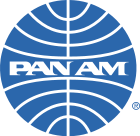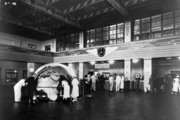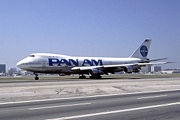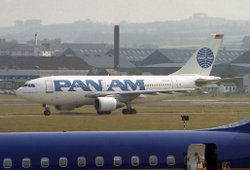Pan American World Airways, commonly known as Pan Am, was the principal international airline of the United States from the 1930s until its collapse in 1991. Founded as a seaplane service out of Key West, Florida, the airline became a major company credited with many innovations that shaped the international airline industry, including the widespread use of jet aircraft, jumbo jets, and computerized reservation systems. Identified by its blue globe logo (widely known as "the blue ball") and the use of the word "Clipper" in aircraft names and call signs, the airline was a cultural icon of the 20th century, and the unofficial flag carrier of the United States




The Gulf War, which began in August 1990, brought transatlantic air traffic to a trickle. On October 23, 1990, the airline sold its profitable London Heathrow routes, arguably Pan Am's biggest international destination, to United Airlines. (The routes would be transferred in April 1991, after British and American regulatory approvals.) This left Pan Am with its only London flights being two daily flights to Gatwick. Pan Am also sold German routes to Berlin to Lufthansa in 1990. Lufthansa had previously not been allowed to fly to Berlin, but such restrictions were lifted with the reunification of East and West Germany. By 1990 many foreigners still perceived Pan Am to be a "flag carrier" of the United States. The airline announced in September 1990 that it would eliminate 2,500 jobs (8.6% of its work force) by October of that year. The airline kept Pan Am Express operations.
Pan Am was forced to declare bankruptcy on January 8, 1991. Delta Air Lines purchased the remaining profitable assets of Pan Am, including its remaining European routes and the Pan Am Worldport at JFK Airport, and injected some cash into a smaller Pan Am predominantly serving the Caribbean and Latin America. During that time, Pan Am continued to incur heavy losses. The Boston-New York LaGuardia-Washington National shuttle service was taken over by Delta in September, 1991. Delta obtained all of Pan Am's remaining transatlantic rights, except Miami to Paris and London, in November 1991.
Pan Am ceased operations on December 4, 1991, when Delta cut off its support. After withdrawing its agreed upon financial support, which would have allowed Pan Am to continue with a hub in MIA, Delta was sued for more than $2.5 billion on December 9, 1991 by the Pan Am Creditors Committee. Shortly thereafter, a large group of former Pan Am employees also sued Delta. Delta was able to combine and move the cases from New York to Atlanta. Delta was also able to prevent a jury trial, which, according to Business Week magazine, its attorneys had stated it would likely lose. The Atlanta judge then dismissed the lawsuits.
Pan Am Flight 103
Pan Am Flight 103 was Pan Am's third daily scheduled transatlantic flight from London Heathrow Airport to New York's JFK. On December 21, 1988, the aircraft flying this route, a Boeing 747-121 registered N739PA and named Clipper Maid of the Seas, was blown up as it flew over Lockerbie, Dumfries and Galloway, Scotland, UK, when approximately 1 lb (450 g) of plastic explosive was detonated in its forward cargo hold, triggering a sequence of events that led to the rapid destruction of the aircraft. The aircraft that crashed was the 15th 747 ever built and was delivered to Pan Am in February 1970.
REFERENCES